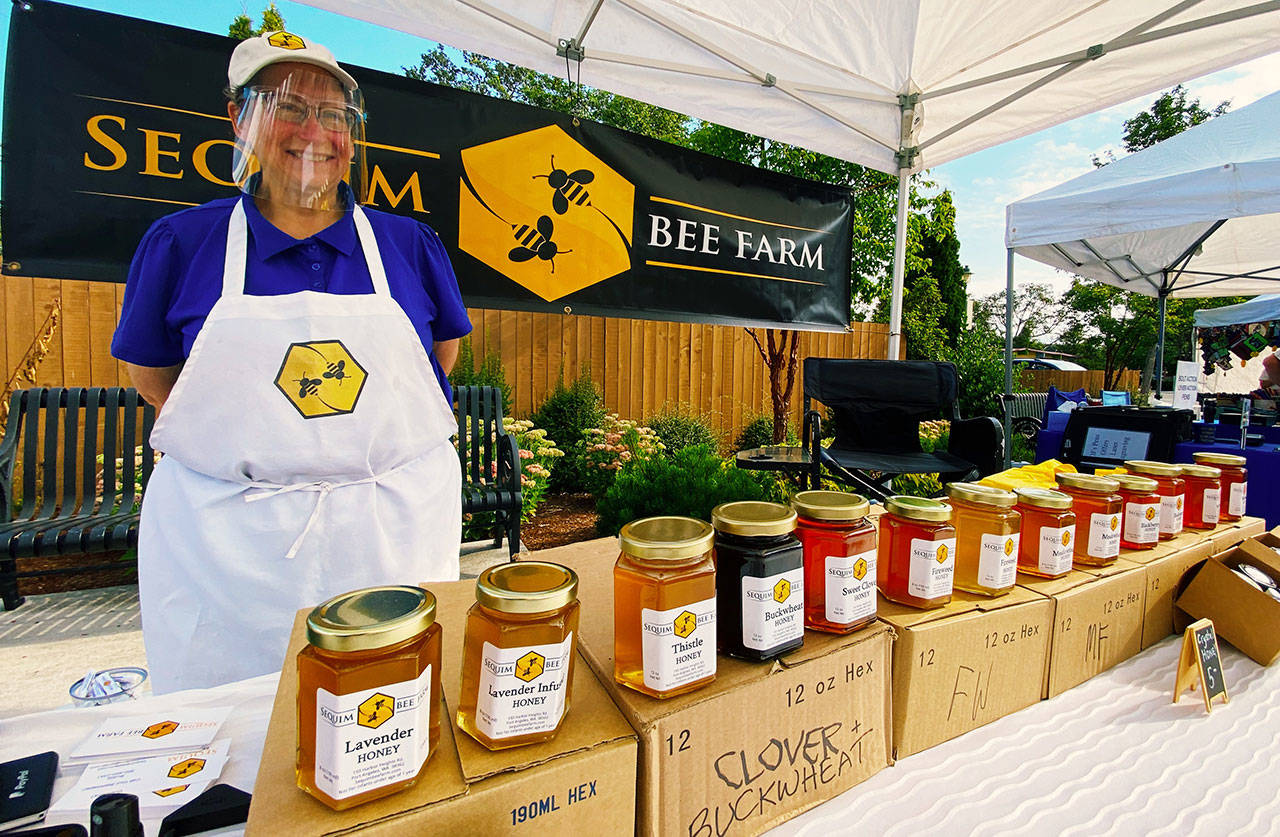Sequim Farmers & Artisans Market
Open: 9 a.m.-2 p.m. Saturday, Aug. 1
Location: Sequim Civic Center Plaza, downtown Sequim
More info: manager@sequimmarket.com
On the web: www.sequimmarket.com
Sequim Bee Farm is passionate about pollinators! Owners Buddy and Meg Depew practice an unceasing commitment to sustainable beekeeping and bee stewardship.
This passion, now the essence of the couple’s livelihood, first began three decades ago on top of a parking garage at Providence Hospital in Seattle where they both worked.
Buddy was informed that a swarm of bees had landed on his truck and that a local beekeeper was on their way to come to relocate the swarm. The couple watched the relocation process with awe.
“I just thought it was fascinating,” Meg said. “I just saw that the beekeeper had this connection to nature that most people don’t know.”
The opportunity arose to follow this interest when the Depews moved to Sequim and had access to open land.
“I said, ‘Well, Buddy, what do you think of keeping bees? My running joke is that fifteen minutes and five hundred dollars later, we were beekeepers,” Meg recalls.
Sequim Bee Farm now has hives all over, from Diamond Point to Port Angeles. The small company offers an impressive array of honey varietals — wildflower, blackberry, thistle, meadowfoam, buckwheat, clover, fireweed, lavender — which all depend on hives living in different fields abundant with particular plants.
It’s important to the Depews that they maintain resident bees, meaning the bees generally live their entire lives in one location. This is distinct from the damaging practices seen in large-scale, conventional honey producers.
“That’s what a lot of large beekeepers do, they literally truck their bees all over the country,” Meg said. “They go down to the almond fields of California, to the orange fields in Florida, then they winter them in Minnesota.”
These poor bees are completely disorientated and the result is this depleted mono-food source. If we all went and only ate almonds for six weeks and then oranges for six weeks, and nothing else, our health would be poorly impacted too!”
There is a tremendous need for ethical, small beekeepers. In the past year, the U.S. has lost 43 percent of its honeybee colonies. This is alarming news when it comes to human food habits.
Three-quarters of the food we eat is directly impacted by bees, Meg said.
“The grain fed to meat animals require pollinators; chocolate, avocados, and cotton for our clothing all have flowers that are dependent on bees,” she said.
While there are more than 2,000 types of pollinators in the country, honey bees are distinct in being the only one to produce a food source for humans.
Unfortunately, the “honey” in your pantry may not be what it’s marketing has led you to believe.
Honey is the most counterfeited food product in the United States. Studies show that more than three-quarters of products labeled honey in conventional grocery stores are not linked to bees at all.
Instead, misled shoppers are purchasing an adulterated, reconstituted mix of the pure product mixed with inexpensive, unhealthy ingredients like high fructose corn syrup.
There is no way to determine if honey is pure except by looking through a microscope for pollen grains suspended in the liquid. These grains are oftentimes filtered out of the final product, meaning that it’s next to impossible to determine whether you’ve purchased a bee product or an unhealthy imitation masquerading under the same name.
It’s impossible — unless you get to know your local beekeeper.
The Depews, in their fifth year at the market, are impassioned by their mission to bring their healthy, pure honey and bee products to the community.
In addition to Sequim Bee Farm’s eight deliciously distinctive honey varietals, market guests will also discover other bee products for purchase: handcrafted beeswax candles, lip balms, food-grade wood polish, and even Paw Balm — a moisturizer for both animals and humans.
“Market is where you can go to get freshly sourced foods and support local businesses,” Meg said. “I think it’s especially important right now; we’re seeing disrupted food production nationally. At the market, we’re all local, we’re not dependent on those national supply lines.”
Sequim Bee Farm supports all small beekeepers in their community, mentioning fellow SFAM beekeeper, Dungeness Valley Apiaries.
The Depews say they enjoy the camaraderie of being part of the local food community in Sequim.
“We’re supporting each other in a community, that’s important to us,” Meg said. “You learn that from the bees, in their hives they all support one another and I think that’s what we’re doing at the farmers market.
“We could learn a lot from those little creatures.”
Find Sequim Bee Farm’s local honey and bee products every Saturday, from 9 a.m.- 2 p.m. at the Sequim Farmers & Artisans Market at Sequim Civic Center plaza.
Emma Jane Garcia is Marketing Manager for the Sequim Farmers & Artisans Market. See www.sequim market.com.



